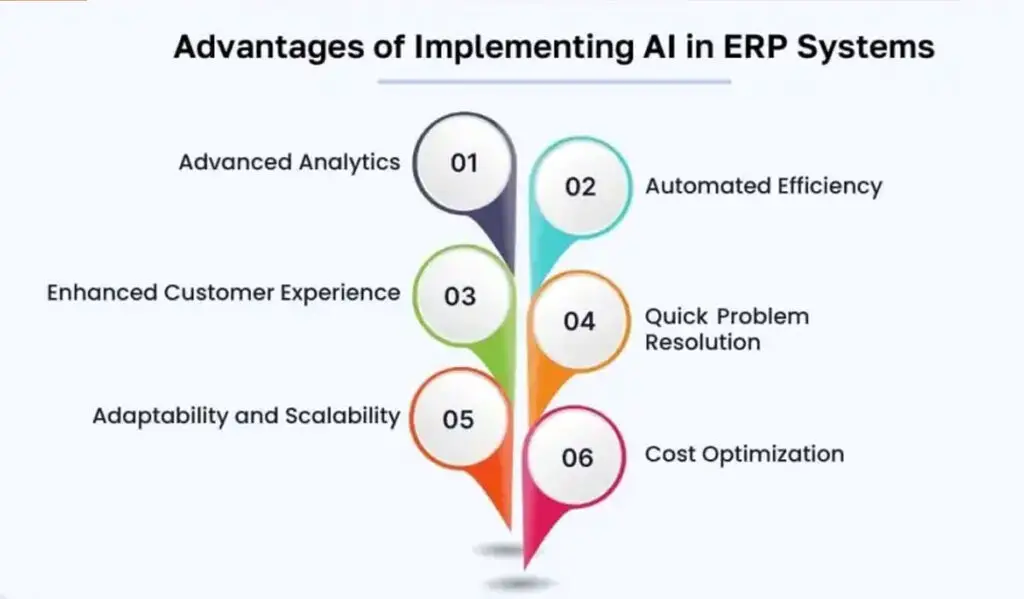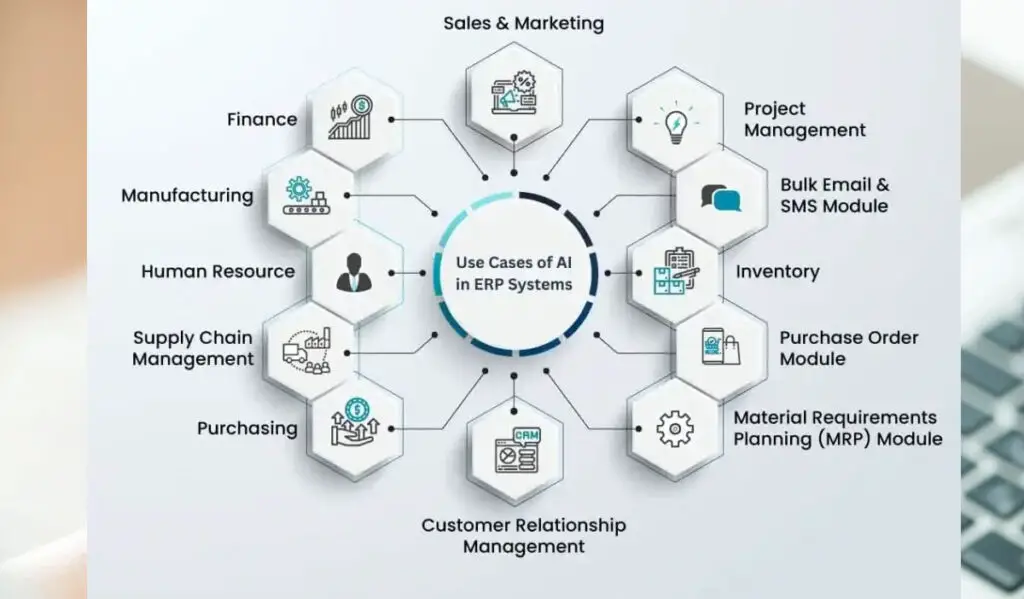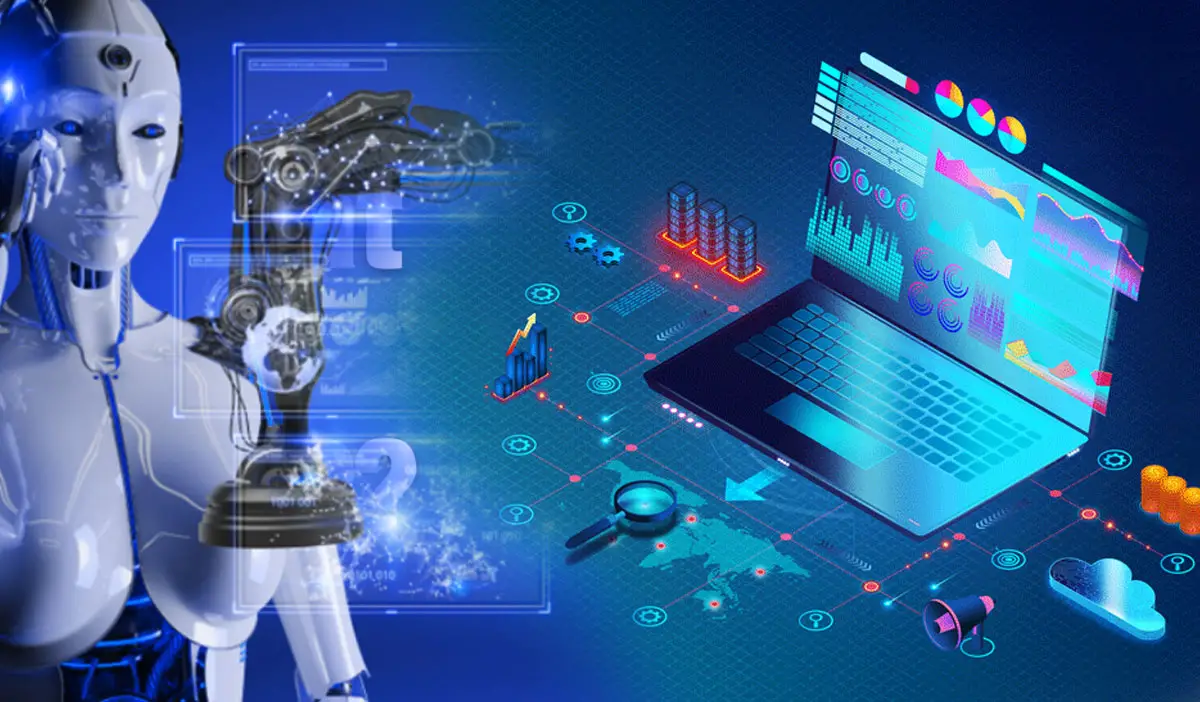In the ever-evolving landscape of modern business, Enterprise Resource Planning (ERP) systems have become indispensable tools. These software solutions empower organizations to efficiently manage a diverse range of daily operations spanning finance, customer service, operations, human resources, and more. As businesses face increasingly complex and dynamic challenges driven by shifting customer expectations, the integration of Artificial Intelligence (AI) into ERP systems has emerged as a game-changing advancement. In this comprehensive article, we will explore the intricate relationship between Artificial Intelligence and ERP, delve into the advantages, confront the challenges, examine real-world use cases, and shed light on AI’s role in shaping the future of ERP software.
What is AI-Integrated ERP?
Artificial Intelligence integration in ERP (Enterprise Resource Planning) systems involves the utilization of AI technologies and techniques to augment the capabilities of ERP software. ERP systems, designed to streamline daily tasks across diverse departments, greatly benefit from the integration of artificial intelligence. AI empowers ERP systems with the ability to provide powerful insights, automate tasks, and enhance operational efficiency. Let’s delve deeper into how AI and Machine Learning (ML) amplify ERP’s capabilities.
How AI and ML Enhance ERP
- Handling Business and Data: Managing vast volumes of customer data can be a daunting task. AI and ML integrated into ERP software can efficiently handle data analysis, spotting trends, generating valuable insights, and streamlining decision-making processes.
- Process Automation: Machine learning helps automate routine business processes, freeing up human resources for more strategic tasks. This automation not only saves time and money but also increases overall efficiency.
- Enhanced User Experience: AI’s integration into ERP systems enhances customer interactions, providing insights into demand-supply dynamics and customer behavior. This understanding leads to improved customer service and market visibility.
- Improved Marketing Solutions: AI and ML provide crucial information about clients, enabling more effective marketing strategies and engagement with diverse market segments.
Benefits of AI in ERP Systems

- Decision-Making: AI empowers ERP systems to analyze vast data sources swiftly, providing valuable insights that enhance business performance and customer satisfaction. AI’s forecasting capabilities contribute to better planning and resource optimization.
- Efficiency and Productivity: AI automates essential tasks, reducing errors and saving time and resources. This allows human employees to focus on higher-priority responsibilities.
- Cost Reduction: AI optimization lowers operational costs, and its risk prediction capabilities help businesses identify and address potential concerns, improving cost-efficiency.
- Personalized User Experience: AI tailors ERP interfaces to individual preferences, facilitating quicker access to essential data and efficient decision-making.
- Optimizing Inventory Management: AI-powered ERP systems analyze sales data, predict demand, and factor in external variables, reducing holding costs while enhancing customer satisfaction.
- Predictive Analytics: AI’s ability to forecast future outcomes aids in proactive risk management, resource planning, and cost reduction.
Use Cases of AI in ERP Systems

AI integration in ERP systems transforms various business operations. Here are some significant use cases:
- Human Resources: AI improves HR tasks such as recruitment, performance management, and employee engagement. It uses natural language processing to identify and analyze candidate resumes, interviews, and performance data.
- Finance and Accounting: AI automates accounting functions, generates reports, and provides insights into profitability and financial management.
- Customer Service: AI assists in customer support through chatbots and virtual assistants, speeding up query resolution and freeing up human agents to handle more complex issues.
- Forecasting: AI uses historical data and real-time conditions to generate forecasts for various operational activities, enhancing planning and decision-making.
The Integration of AI in ERP
ERP systems, critical for managing complex business data, benefit significantly from AI integration. This combination streamlines processes, reduces errors, and lowers operational costs.
Is AI Shaping the Future of ERP Software?
Absolutely. AI is revolutionizing ERP software, making systems more efficient, productive, and intelligent. With AI’s capabilities, ERP systems can automate tasks, provide customer support, and generate valuable insights. The future of ERP software is undoubtedly intertwined with AI.
Challenges of ERP AI
While ERP AI offers numerous benefits, it also presents some challenges:
- Data Integration: High-quality data is crucial for AI-powered ERP, and data integration can be complex. Inaccurate or inconsistent data hampers AI effectiveness.
- Expense: Implementing AI in ERP requires a significant upfront investment, which may pose challenges for smaller businesses.
- Technology Adaptation: Employees may fear job displacement and face challenges in adapting to AI technology. Comprehensive training and change management strategies are essential.
- Privacy Concerns: AI-powered ERP systems process sensitive customer data, raising concerns about data privacy and misuse. Robust data governance is necessary to address these concerns.
Best AI for ERP
Several ERP systems leverage AI to enhance business operations:
- Oracle NetSuite: A cloud-based solution offering modules for various purposes, including accounting, finance, and customer relationship management.
- Infor: A cloud-based ERP solution serving diverse industries, employing AI for industry-specific solutions and automation.
- OneHash AI: A CRM and ERP platform powered by AI, offering features for sales, operations, and marketing, along with AI-driven insights.
Conclusion
Artificial Intelligence’s integration into ERP systems is a transformative force in modern business. Its ability to generate insights, automate processes, facilitate decision-making, and enhance customer support is reshaping the professional landscape. In the coming years, AI is expected to play a pivotal role in the future of ERP software, offering substantial benefits, albeit with certain challenges. This guide has explored the multifaceted relationship between AI and ERP, revealing a future where AI is a driving force in optimizing business operations.

